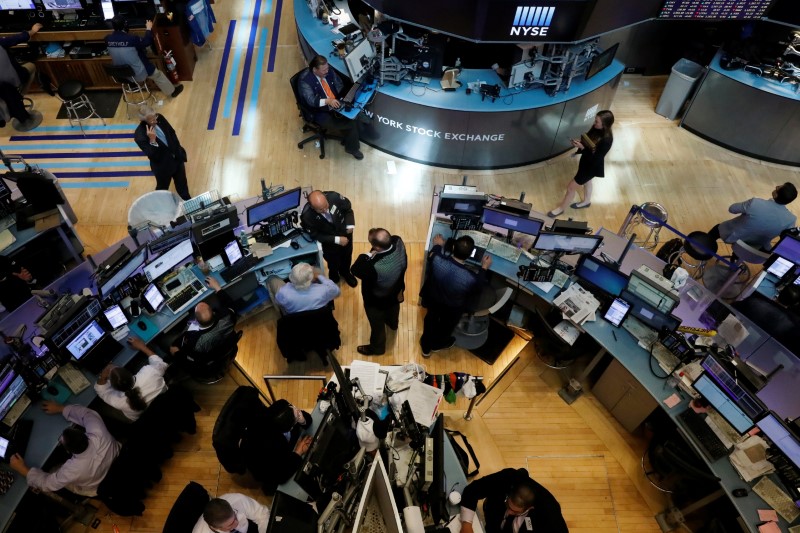By Geoffrey Smith
Investing.com -- U.S. President Joe Biden acknowledges the risk of a recession for the first time as the IMF cuts its growth outlook for the U.S. The drama in U.K. bond markets continues as the Bank of England sends mixed signals about its intentions. Stocks are ready for a bounce after the NASDAQ fell into a bear market on Tuesday as Pepsi beats forecasts in the third quarter. Europe survives a scare about another leaking Russian oil pipeline, and the OPEC and EIA outlooks on the oil market are due. Meanwhile, central bankers continue to take it in turns to speak on the fringes of the IMF's autumn meeting. Here's what you need to know in financial markets on Wednesday, 12th October.
1. Biden acknowledges recession risk as IMF slashes forecasts
U.S. President Joe Biden, for the first time, acknowledged the risk that the U.S. economy will fall into recession, on the same day that the International Monetary Fund slashed its growth forecasts for the country (and the rest of the world) and the NASDAQ fell back into a bear market.
"I don’t think there will be a recession," Biden told CNN. "If it is, it'll be a very slight recession. That is, we'll move down slightly."
Earlier, the IMF had downgraded its forecasts for the U.S. economy to 1.6% for the current year and only 1.0% next year.
2. Bank of England drama continues
Confusion reigned in the U.K.'s markets as conflicting reports about the Bank of England's intentions undermined the message that Governor Andrew Bailey had tried to convey on Tuesday.
Bailey had said that the Bank would stop buying U.K. government bonds outright at the end of Friday, switching to a regime of liquidity support based on repo operations, whose impact on the money supply can be neutralized more easily. However, unnamed financiers told the Financial Times that the Bank had signaled it might be willing to extend its purchases beyond Friday, nonetheless.
There was comparable confusion about the government's tax and spending plans, which are behind the volatility in U.K. markets. The government confirmed it would, after all, impose a windfall tax on renewable companies to finance some £60 billion ($67 billion) of energy subsidies over the next winter. That encouraged hopes that more of the unfunded tax increases and subsidies that the new government had proposed last month would also be unwound.
The pound rose 1.0% to $1.1071 but the yield on the benchmark 10-Year Gilt soared another 16 basis points to 4.60%.
3. Stocks set for a bounce as Pepsi beats forecasts
U.S. stock markets are set to open higher, steadying after fresh losses on Tuesday that left the NASDAQ Composite back in bear market territory, down over 20% from its peak.
By 06:20 ET (10:20 GMT), Dow Jones futures were up 135 points or 0.5%, while S&P 500 futures were up 0.6%, and Nasdaq 100 futures were up 0.8%.
The release of U.S. producer price inflation figures for September is likely to grab the early attention, given the big role played by corporate profit margins in driving prices higher earlier this year. Stocks in focus include the energy sector, after nuclear power group Westinghouse Electric agreed to be bought by a consortium of Brookfield (NYSE:BEP) and Cameco (NYSE:CCJ).
Sentiment may get a boost from PepsiCo (NASDAQ:PEP) earnings, after the drinks group beat expectations and raised its guidance for the year, defying headwinds from the strong dollar.
4. Korea hikes, citing weak won; Lagarde, Bowman speeches eyed
Global interest rates remain front and center as the International Monetary Fund’s autumn meeting grinds on, with ECB President Christine Lagarde scheduled to speak later. Bank of France Governor François Villeroy de Galhau did nothing for the euro earlier by dangling the possibility of a hike of only 0.5% in the key refinancing and deposit rates the next time the ECB meets in late October.
Overnight, the Bank of Korea raised its key rate by 0.5% to 3.0% as expected and said further hikes would be necessary due to the fact that the weak won was pushing the price of imported goods higher.
Fed Governor Michelle Bowman is also due to speak later, while Michael Barr, the Fed's head of banking supervision, may give an insight into the chances of U.K. volatility spilling over into U.S. markets. The markets for junk bonds and CLOs have already started to show signs of forced selling.
5. EIA, OPEC reports due; Pipeline scare in Poland passes
The Organization of Petroleum Exporting Countries and the U.S. government will both release regulator updates to their respective takes on the oil market. OPEC's monthly report for October is due first, followed by the Energy /Information Administration's short-term energy outlook.
The oil market rode out a scare earlier after Polish pipeline operator PERN discovered a leak in the main strand of Russia’s largest oil export pipeline, the Druzhba. PERN later concluded that the leak was an accident, rather than the kind of sabotage seen against Ukrainian and European infrastructure earlier this week.
U.S. stockpile data are due at 16:30 ET (20:30 GMT) from the API, a day later than usual. The Department of Agriculture's monthly WASDE report is due at 12:00 ET (16:00 GMT).
